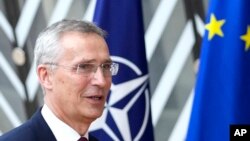The announcement of Stotenberg's command renewal comes one week ahead of a summit of NATO leaders in Lithuania that will be dominated by the Western military alliance's response to the conflict and Ukraine's push for membership.
"Honoured by NATO allies' decision to extend my term as secretary general until 1 October 2024," Stoltenberg, 64, said in a statement. "In a more dangerous world, our alliance is more important than ever."
NATO's 31 countries made the call to extend the tenure of the former Norwegian prime minister - at the helm of the alliance since 2014 - after failing to agree an obvious replacement.
The extension will see Stoltenberg remain in charge through to a July 2024 Washington summit marking the 75th anniversary of NATO's founding.
Some countries were hesitant about granting him a one-year extension, for fear that choosing his successor will become intertwined with jostling for top EU jobs after European elections next June.
There are also worries that the run-up to the U.S. elections in November 2024 could disrupt the search for a replacement.
NATO nations on the alliance's eastern flank were pushing for someone from their region to take the reins, to underscore a tougher stance on Russia.
Britain's Wallace put himself forward but numerous NATO allies wanted a former head of state or government in charge, and France insisted on someone from an E.U. country.
Stoltenberg - whose tenure was already extended for a year shortly after Russia's invasion of Ukraine in February 2022 - has the strong backing of the United States and other key allies.
Ukrainian Foreign Minister Dmytro Kuleba welcomed the latest extension and said Stoltenberg has shown "strong leadership" in tough times.
The NATO secretary general has won plaudits for his cool-headed leadership of the alliance at a time when the biggest armed conflict since World War II has roiled Europe and reinvigorated NATO.
That has involved maintaining stalwart support for Kyiv while also making sure the war does not spill over into a potential nuclear conflict between NATO and Russia.
The summit in Vilnius will see Stoltenberg treading a fine line again as he seeks to bridge gaps between Ukraine's demand to join NATO and the reluctance of dominant power the United States to offer a clear timeline for that process.
Leaders will sign off on new defense plans and spending goals as the alliance undergoes it biggest overhaul in a generation in the face of Moscow's invasion of Ukraine.
The NATO chief will also try to push Turkish President Recep Tayyip Erdogan to drop his objections to Sweden's membership bid.








Forum